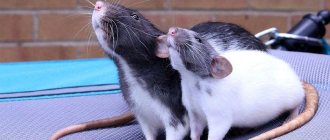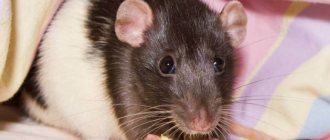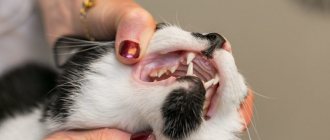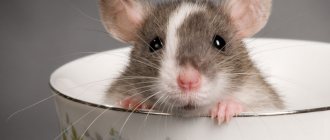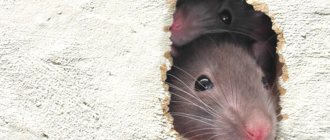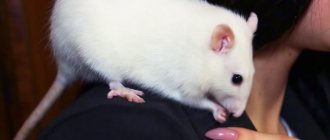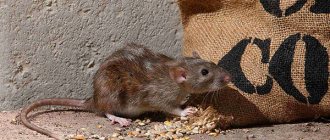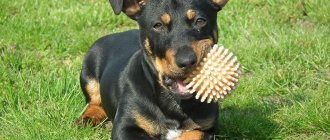- home
- Rat
03/07/2020 As a rule, experienced owners are well versed in the habits of pets. Beginners often become confused when they discover a strange habit in a decorative pet. Such “mysterious” manifestations that confuse the owner in domestic rats include chattering and grinding of teeth. The article explains why rodents do this, what such a habit means, and how to distinguish one manifestation from another.
At rest
Rodents' teeth constantly grow in length. Rats may grind their teeth to keep them at a reasonable and healthy length. If they didn't, their teeth would continue to grow indefinitely. Rat teeth that are too long can cause serious problems, especially difficulty chewing food.
Sometimes rats are simply born with misshapen teeth due to inbreeding, and they may have difficulty chewing and wearing down their teeth properly. In this case, the best way to keep your rat's teeth at normal length is to give them something to chew. Safe wood, rat pellets, and toys that allow rats to chew will naturally wear down their teeth to a safe length.
Nervous excitement and anxiety
Knocking, grinding and creaking are far from the only sounds that rats make with their teeth. Another sound option is the clicking of incisors. This sound made by a rodent indicates the following feelings and emotions of the pet:
- Frightened;
- extreme interest;
- peak of curiosity.
It is worth noting that curiosity in rats is expressed only by this sound and no other.
You can distinguish fear from interest and overexcitation by a number of characteristic additional signs. Clicking symbolizes fear and negative emotions if the animal:
- The body is tense;
- the fur stands on end;
- eyes do not blink;
- the gaze froze on one point.
These manifestations are signs of fear and stress. If the animal not only clicks its teeth, but also squeals and hisses, it means it is ready to attack. If several individuals live in a cage, a violent fight can only be prevented by isolating the aggressive person.
Excitement
If you hear your pet rat's teeth chattering extremely noisily, it could mean that something is making him nervous and upset. She may be bothered by something—perhaps the sound of someone hammering a nail into the wall in the next room.
Cats and larger animals hiding around her cage cause undue stress, as do loud noises. Rats have very sensitive hearing. Constant loud noises can cause anxiety in the animal. For us, even ordinary noise - for example, washing dishes - will seem very loud to the rat. Noises, especially loud ones, are terribly disturbing to rats.
You may upset your pet without even realizing it. A long list of common stress triggers in rats includes:
- Loud unexpected sounds.
- Changes in daily routine, including set feeding and play times.
- Too much time alone.
- New experiences such as veterinarian visits or road trips.
- Presence of other potentially predatory animals or pets.
- Too much time in the cage.
- Small, unsanitary living quarters.
- Low temperature and insufficient ventilation.
- Too much bright light.
- Excessive attention from people.
- Being bullied by another rodent in the same cage.
- Boredom and limitation of instincts.
- Grief, for example, the loss of a close friend.
Stress isn't just about mental exhaustion in rats. It's also physically dangerous. A stressed pet often becomes susceptible to illness and disease.
Symptom of the disease
Decorative rats have reduced immunity, so they get sick quite often. Their diseases can be of a very different nature. Most pathologies, if not all, are accompanied by pain and discomfort in the animal. To inform its owner that it is unwell, the rat chatters its teeth.
The animal begins to signal at the stage of moderate or tolerable pain. To prevent even greater suffering for your pet, you should immediately contact a veterinarian.
Due to possible illnesses
Sometimes teeth grinding in a rat is a sign of pain or illness. However, more often than not, this behavior indicates happiness, relaxation, or may even be a natural behavior to ensure the correct length of the teeth. Rats tend to grind their teeth loudly when they are feeling unwell, in pain, or stressed. This type of sharp grinding usually comes from the back teeth. Also, these symptoms may indicate problems with the well-being of the rodent:
- Reluctance to be communicated with.
- Changes in behavior (apathy).
- Decreased appetite.
- Diarrhea, soft stools, or other forms of feces.
- Low energy (lethargy).
- Excessive drooling.
- Tearful eyes.
Contact your veterinarian immediately if your rat exhibits these symptoms. Don't expect your rodent to get better on its own, as this could lead to more serious problems developing. Even though these symptoms may simply mean stress or anxiety, it's better to be on the safe side. If possible, remove your pet's teeth grinding and show it to your veterinarian.
Grinding of teeth as a sign of pleasant sensations
The most common cause of the characteristic grinding of teeth is the rat being in a state of joy and peace, which the animal wants to communicate to the owner. A rat grinds its teeth with happiness and pleasure when its owner does the following:
- petting the little animal;
- sits the pet on his shoulder;
- scratches the pet behind the ear, etc.
Contact with the owner is always a joy for a small rodent. The grinding of a tailed animal's teeth, which accompanies the pet's pleasant time together with its owner, is equivalent in its semantic meaning to the purring of a cat.
Hearing such a squeak, the owner of the rat can only rejoice - his pet is happy and really wants to express his love. If the animal complements the sound with strange body movements (it seems that the rodent is vibrating) - this is a sign of the apogee of joy and the recognition of the animal that its owner is the best in the world.
What happens if the incisors become too long?
A wild rat can usually keep its incisors to a reasonable length. However, her domestic companion often requires the help of a person who cares for her. Too long incisors can not only lead to injuries to the lower jaw, but also cause malocclusion (misalignment of the lower jaws). With an incorrect bite, other aggravations occur that can cause malaise or discomfort. Along with an incorrect bite, overgrown teeth cause root growth. When a root grows for too long, inflammation and infection are sure to occur.
There are many pet products that can help keep your rat's teeth looking their best. Chew blocks, treats, and toys all function as chewing devices, filing teeth down to a manageable size. Plus, these toys keep your rat active. Monitoring your rat's eating habits is a great way to make sure its teeth are healthy. A trip to the doctor can never hurt—even if your rat is a tiny creature, he will still feel pain acutely. Bad teeth and a sore mouth are no pleasure for any creature!
Grinding teeth with pleasure
The most common situation for a characteristic creaking sound is a state of peace and joy. It occurs when the owner puts the animal on his shoulder, scratches behind the ear, strokes it and interacts with the pet in other ways. In this case, the decorative rat makes sounds whose meaning corresponds to the purring of a cat.
The animal shows its owner love and happiness from being taken care of. Sometimes body vibration is added to the sound. This is the highest degree of joy.
Less common cases
Another option is that the rodent experiences joyful moments for some reason. This usually happens at the moment when the owner caresses his pet. The sound is equivalent to a cat purring. In case of particularly strong emotions, body vibration is added.
When you are scared or excited, you can hear a similar sound. However, these emotions are accompanied by characteristic behavior in everything else, so they are quite easy to read and distinguish:
- Rising wool;
- Body muscles look tense;
- The gaze is directed in the direction of the source of experiences. Usually frozen and hardly blinking.
The most common situations are when a rat experiences negative emotions:
- The appearance of new unfamiliar pets next to the rodent;
- Unfamiliar environment;
- Visit to the veterinary clinic.
Sometimes passions boil with such force that the animal begins to prepare for an attack. This happens when a new tenant moves into the cage. The aggressor must be immediately isolated, otherwise a fierce battle and spilled blood cannot be avoided.
Curiosity and interest can also cause teeth grinding.
Prevention of bruxism
Even if you get rid of bruxism attacks during treatment, the disease may occur again. Therefore, for prevention, you should adhere to certain rules:
- Make sure that your teeth are not clenched during the day, and stop yourself if you try to grind them.
- Try to stick to your daily routine, play sports, and walk more in the fresh air.
- Drink less strong tea and coffee.
- When stressed, brew herbal soothing teas, for example, with mint, lemon balm or chamomile.
Tea with mint
- Monitor your health, visit a doctor for gastrointestinal diseases and other problems.
- Try to expose yourself to less stress. It may be useful to visit a psychotherapist regularly to help you cope with difficult life circumstances.
- Make sure your diet contains enough B vitamins, magnesium and calcium. You can consult your doctor to prescribe these microelements.
Magnesium
Features of incisors
Thanks to their strength, the animals chew through not only wood, bricks and concrete, but even metal. Incisors appear in rat pups a week after birth. Their growth process is accelerated - up to 2-3 mm per week. They reach their usual length by the age of two months. But their growth not only does not stop there, but also does not slow down.
The constant growth of incisors requires regular grinding. Excess length causes many problems, including the death of the animal.
They are covered with enamel only on the front. The back surface is covered with a soft, fast-wearing substance called dentin. This heterogeneous coating determines the sharpness of the incisors.
Tail movements
One of the main indicators of a rat’s mood is the “behavior” of its tail. An attentive observer will be able to accurately determine the emotional state of his pet if he pays attention to the longest part of his body.
Table 2. How to decipher rat tail movements.
| Nature of movement | What does it mean |
| Lightly swings left and right | The rat is in good spirits, glad to see the owner |
| The tail twitches or freezes in a static position, often quite unnatural | Anxiety, defensiveness |
| Swings in both directions, range of motion is quite large | The animal is stressed and very scared. Perhaps the animal is in an inadequate condition |
The behavior of rats in the search mode differs significantly from their behavior in a calm state. At the same time, sick animals can be distinguished by slow movements and a “lifeless” tail dragging along the floor.
A healthy rat is usually very curious. She enjoys exploring her surroundings. If a rodent is interested in something, it usually rises on its hind legs and sucks in air through its nose. The rat's tail is slightly tense and sometimes motionless.
The animal can enthusiastically turn its head while searching for an interesting object. In this state, the rat turns on all external analyzers, examines visible objects, sounds, and smells.
Moustache wiggling
Rat whiskers are sensitive antennas that help animals navigate in space. The information that rodents receive with the help of such a navigator is so detailed that the animals not only move confidently in the dark, but also receive an almost complete understanding of the surrounding objects, including the features of their dynamic trajectory.
When a rat moves its whiskers, it not only explores odors, collects information about the world around it, but also maintains the balance of movement. It is with its sensitive whiskers that the animal first of all checks unfamiliar objects, including the palms of people.
When should you be wary?
So, the same sound can mean both good and bad emotions; you need to delve into the context of what was “said.” Look at the environment, at the events that preceded the sound.
List of sounds that you should be wary of when you hear them:
- The animal squeaks shrilly. If no external irritants are found that need to be eliminated, the animal should be taken straight to the veterinarian.
- Grinding of teeth almost always means problems with chewing function. It is necessary to examine the animal's teeth. An infection can settle there. Only a veterinarian can see this.
- The loud cry of a rodent means that the animal is scared and in danger. Stress factors for the pig must be eliminated, otherwise it can become seriously ill.
- Wheezing when breathing is also a reason for urgent medical attention.
Each animal can bring personality and express special emotional notes. The squeak of a guinea pig is an expression of a palette of feelings. Recognizing them is a difficult but interesting task.
Guinea pig at home.
Why does a rat pee on your hands?
The pet doesn’t pee so much as mark its owner, and that’s normal. Like dogs, rodents must “stake out” their territory, including their owner and his belongings. Marking differs from peeing by the volume of urine produced: a drop is enough to indicate ownership.
Rats often mark their hands
The rat “pees” on people if they are saturated with strong odors: perfume or detergents. It is almost impossible to stop a rat from marking. A young male can be castrated, but this will not be a 100% guarantee either.
Frequently asked questions about the care and maintenance of decorative rats
Scavenger hunt
The desire to create reserves, deeply rooted in the rat’s nature, sometimes leads tailed pranksters to the trash can. If the owner does not have the habit of closing the container with a lid and often lets the animal walk around the house on its own, he should be prepared for the inevitable - the animal will get into the habit of carrying objects from the trash heap.
Most rats will pick up and take back to their nest anything that can be chewed. These can be wooden, plastic, rubber objects, pieces of fabric. Rodents masterfully arrange stashes of food reserves; they are quite difficult to find. In order to have such closets, the animal must have a certain amount of time when the control of the owners is completely absent.
Knocking and grinding as a cause for alarm
Representatives of rodents bred for domestic keeping are usually susceptible to a whole range of various ailments, the course of which may also be accompanied by the sound of grinding or chattering of teeth. Diseases for which you need to be prepared:
- a wide variety of tumors;
- strokes and heart attacks of all possible types and types;
- infection with mites and their further penetration into the body;
- problems related to the respiratory system;
- overgrown incisors that began to dig into the skin and cause acute pain.
The sounds that an animal makes when sick are designed to attract the owner’s attention to itself. The pain and discomfort are still moderate and tolerable for now.
Before the rodent begins to suffer, it is worth taking action and contacting a specialist for help.
How to understand a decorative rat - tips for owners
How to understand decorative rats
Many pet owners complain that sometimes they don't understand what their pets are trying to say through their behavior. Now, if only you could learn to understand the language of cats (you can find useful tips here - they will help you learn to understand your cat), dogs and, of course, decorative rats - which are quite popular candidates for the role of a pet.
Our publication today will try to help you with this, and we will tell you how to learn to understand your decorative rat...
